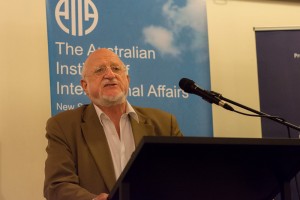Malaysia
UNSW emeritus professor Clive Kessler last addressed AIIA NSW at Glover Cottages in May 2015, when he described ethno-supremacists pursuing an agenda to establish Islamic religious dominance. His focus was on Malaysia.
He updated us on Tuesday 20 April 2016 on a related subject – the deep, fundamental and protracted political crisis in Malaysia to which the Australian press is beginning to pay more than its usual fitful attention.
The seeds of disharmony were sown in the colonial years of the 19th century. Large numbers of Chinese migrated to British Malaya to mine tin. Many Indians were attracted to cultivate newly-established rubber plantations. Easygoing Malays were displaced from the economic process. The corrective Merdeka process of 1946, fostered by Tunku Abdul Rahman, the ‘Father of Independence’ (Bapa Malaysia), idealistically sought freedom for all Malays in a nation state of independence and equality. But race riots erupted in 1969. The Constitution was re-written, not by courts or parliament but politicians. Malays were now given a substantial unearned stake in Malay society and Malay overlordship was retrofitted to replace equality. The New Economic Policy (NEP) of 1971 was adopted for 20 years. Like a speeding bus, it became an out of control affirmative action program of social engineering. It was succeeded by the National Development Policy of 1991. Malay supremacy and economic advantage became the founding social contract. No-one could question it. The Asian financial crisis of 1997 was largely due to Japan’s economic slow-down. Japanese investments in Malaysia slowed too, which only increased pressure for Malay supremacism. Neither Mahathir Mohamad nor his successor Abdullah Badawi had the will or power to dismantle the NEP. Everyone who originally supported the inclusionary ideals of UMNO were influenced by the Malay supremacist movement, now enforced by the kris – a symbol signifying Malay preparedness to uphold superiority by violence. By 2008, UMNO, the Malay governing alliance, could not maintain its inter-racial representation nor restrain Malay supremacists. By the 2013 elections, the Barisan Nasional, a coalition of 14 parties including UMNO, emerged as the new force. Prime minister Najib Razak ruled with the consent of Islamic forces. Sacralisation of the political process continued. BP/UMNO only won the 2013 election with enormous financial support from Middle East supporters. The country was awash with money, due as much as anything to Najib going to Saudi Arabia flaunting his Islamic credentials.
The present situation in Malaysia exposes the myth of moderate Islam. Deeply reactionary Islamic forces are in power, and prime minister Najib is captive to them. Clive sees no way in which the situation can be modified, let alone reversed. Moderate Islamic forces in the country are not strong enough. Will Najib get away with widely reported corruption? He will if the Islamic powers that now control him think it is in their interests for him to remain in power.
Report prepared by Richard Broinowski
